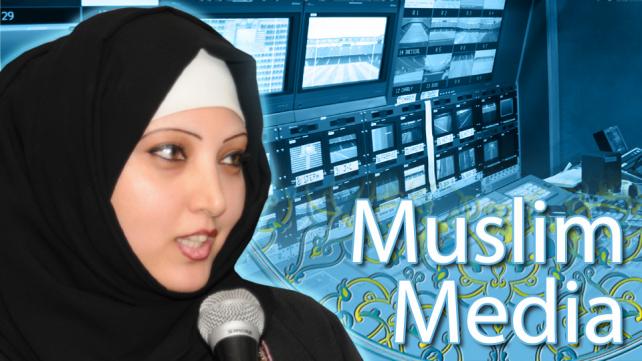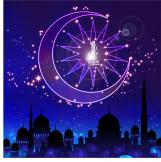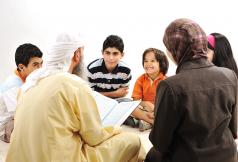
How far have we gotten and where do we still have to go?
In over 30 years, Muslims and the media have gone from being a virtual non-issue to becoming the subject of books, conferences, articles, meetings with media outlets and PhD.. dissertations.
In these three decades, this relationship has undergone continued strain, and more recently, positive change.
Ibrahim Hooper is Communications Director of the Council on American-Islamic Relations (CAIR).Ayesha K. Mustafaa is editor of the Illinois-based weekly newspaper The Muslim Journal. In interviews with Sound Vision and RadioIslam.com, they outline some of the major changes, roadblocks and steps ahead for Muslims and the media.
The news media is more careful of its reporting
"We have seen a good change in the coverage in the past six years since CAIR was formed," notes Hooper in an interview from his office in Washington, D.C.
"Now journalists are much more reluctant to label everyone as a fundamentalist, everyone as an extremist and make gross generalizations about Islam and the Muslim community. It's still not there but they're beginning to differentiate between individuals and Islam or individual acts and Islam and groups. They're becoming more aware of the nature of the Muslim community worldwide and don't always perceive it as monolithic."
However, these distinctions are not being made often enough, despite the fact that most journalists do not make similar generalizations of other religious groups.
"The old example we always give is the IRA (Irish Republican Army) in Northern Ireland," says Hooper. "When they blow up something, no one blames the Catholics and if somebody said it was the Catholic church that was at fault they'd go, ‘that's ridiculous' because they know what Catholicism is. But when somebody does some violent act in the name of Islam, they say, well, maybe it is Islam because they don't have a context in which to put that individual act."
Islam no longer perceived as monolithic or only Arab
Hooper notes that another change is the understanding amongst more journalists and media professionals that Islam is not an Arab religion, but an ethnically diverse one with local roots.
"As long as Islam was perceived as this foreign, exotic religion, it was very difficult," he says. But now I think reporters are recognizing that Islam is indigenous to North America."
The 1992-95 war in Bosnia and the genocide in Kosova in 1999 also played a role in shattering the myth of a monolithic Muslim world.
"I think it shocked people to realize that there are blond, blue-eyed Muslims and European Muslims...and that Muslims can be victims as well as perpetrators," says Hooper.
Muslims creating their own media
Muslims today, though, are not just fighting stereotypes, outside looking in. They are increasingly taking the media into their own hands, knowing full well that sitting on the sidelines is ineffective.
A number of Muslim magazines, if not most, are connected to Islamic institutions. Islamic Horizons, for instance, is a publication of the Islamic Society of North America (ISNA). The Message is a publication of the Islamic Circle of North America (ICNA). Other publications are connected to local mosques and Muslim Students' Associations. Others still are independent. They range from quarterly, to monthly to weekly. So far, no one has reached the target of being a daily publication. But the need for Muslim publications cannot be ignored.
"Mainstream media cannot address all the issues for all communities equally," says Mustafa of the Muslim Journal. "Therefore, each one has to have its own vehicle to make sure that those issues and those ideals that are important to them are always presented in this proper context. It's no less the case for Muslims."
"It is our obligation to present Muslims and the good works that they are doing," she adds.
The 25-year-old weekly newspaper was born out of the experience of African-Americans who left the Nation of Islam following the death of leader Elijah Muhammad in 1975 and accepted true Islam.
The publication, Mustafa explains, became a vehicle for Islamic education for many of these new Muslims and focused on their aspirations and concerns. Today, the paper is one of the most well-established publications in Muslim America and its focus has broadened to the Muslim community in America and the world, not just the African-American Muslim community.
But the Muslim Journal is not a mere public relations organ for the Muslim community.
"Of course there are controversies, there are sad moments in the lives of any community and we are there to report on those events and ideas also. We cover the gamut," she says in an interview with Sound Vision and RadioIslam.com from her home in Illinois.
The Christian Science Monitor: a model for development
Mustafaa says one publication that she sets as a standard is the U.S.-based weekly newspaper The Christian Science Monitor.
"Although it's Christian-based in its faith, in its reporting...religion is not the over current," she explains.
"They are where the media needs to be. Usually [in] remote areas, areas in conflict and we would assume, that based on their religious faith, that their obligation is to be accurate and to be fair. So therefore, we want to have the resources and the outreach and the courage as we would see in a newspaper like the Christian Science Monitor to be a paper from Muslims, about Muslims but also out in the world to report on events as they are happening and to give an accurate report"
The danger of having Muslims in the media
Some Muslims have felt that the solution to the problem of Muslims and the media is by having more Muslims enter the fields of journalism and communication. But Hooper takes views this with carefully.
"You need to be careful," he warns. "It's like you're always sending African-American reporters to cover the inner city. You know you don't want that person just to be some token and representative of a particular religion or ethnic group"
Education of journalists is the key
But even with the presence of Muslim media and Muslims in the mainstream media, stereotypes and prejudice persist. This is where, according to Hooper, Muslims need to actively work to educate journalists.
"When CAIR started it was recognized that there was a great need for some vehicle to educate the media about Islam and the Muslim community," he says.
"I think prior to that time there was really no restraint on the media. They could say whatever they wanted and a few people would challenge them but there was no organized way to challenge stereotypes and bias in the media. CAIR's success, Alhamdu lillah (Praise be to God), has been [in] having a systematic approach to education of the media."
But this needs to be a continuous process.
"There's still people who know nothing about Islam and still have to write stories or edit stories about it and it's up to us in many ways, to educate these people," notes Hooper.
Oklahoma City bombing, 1995: an eye-opener for journalists
If any event changed the relationship between Muslims and the media, it was the April 1995 bombing of the Alfred P. Murrah building in Oklahoma City, the worst terrorist attack on U.S. soil in American history. Hooper describes it as a "watershed event".
"When Muslims were first accused of it and there were several days of anti-Muslim hysteria and when it so quickly became apparent that it was not a Muslim who did it, it was kind of a slap in the face to many journalists who realized their bias when it was not apparent to them before," he says.
In the hours after the bombing, fingers pointed almost automatically to Muslims. It was later discovered that anti-government white supremacists were responsible for the attack which led to the death of over 160 people, including children.
Muslims are more assertive today
The days of Muslims ranting and doing nothing about media bias and prejudice against Islam and Muslims are still here, but more Muslims are willing to challenge these perceptions.
"Even something as small as a letter to the editor is sometimes revolutionary," notes Hooper. "That people, particularly those who came from overseas, where if you wrote a letter to the editor you got a knock on the door at midnight and got hauled off to jail, to get somebody from that environment to write a letter to the editor about anything is quite revolutionary."
Muslim assertiveness has paid off.
"Just as every other religious and ethnic group defends its image, Muslims are beginning to defend their image and that makes an impact on the reporters who don't want to be accused of inaccuracy or bias," says Hooper.
The entertainment industry: bigotry's last bastion
If there is one area where portrayal of Muslims has not seen an improvement, it's in Hollywood.
"That is the last bastion of anti-Muslim bigotry, the entertainment industry," notes Hooper.
"They haven't changed, in fact they may have gotten worse over the years. That's our next big hurdle for the Muslim community is to fight these stereotypes coming out of Hollywood."
Films like the fall 1999 movie The Siege and more recently, Rules of Engagement, continued to portray Muslims as bloodthirsty, backwards terrorists. Both movies drew protests from Muslims, especially in the U.S.
Hooper notes that whole new strategies have to be developed to deal with this new brand of media prejudice. But he says work on this has started already.
"I think we're just in the initial stages of that."







Comments
I just wanted to say that Muslims are in dire times. Where mainstream media is portraying Islam as a perverse religion with perverse followers. These "anti-Islamic" inept generalizations are prevalently outspoken in mainstream media. I believe that there needs to be a change. A change in which that muslim youth rises to educate themselves and become elite leaders in journalism, political science, and so on. Time is very important and muslim community in diaspora needs to realize the importance it. May Alla bless all mumins
Location
Assalamu Allikum,I had a comment about Br. Ibrahim Hooper's comment in the paragraph, "the danger of having Muslims in the media." He says that "It's like you're always sending African-American reporters to cover the inner city. You know you don't want that person just to be some token and representative of a particular religion or ethnic group." Br. Ibrahim is only referring to reporters, but reporters are not the ones who usually choose what to cover and are not the ones who make the decisions on what to air or what is news worthy. These are the producers and news directors. These people who are BEHIND the scenes, are the ones who control the media and make decisions. Looking only at what we see on TV (the reporters) is very shallow. In addition, Muslim reporters are not only going to report on Islam but anything that enjoins good and forbids evil as Islam teaches us. Therefore we should not discourage Muslims to enter journalism and mass communications and there is no " danger of having Muslims in the media." Jazakum Allahu Khair for all your efforts and may Allah (swt) bless all those who work for His sake.Wasalamu Allikum
Location
Add new comment